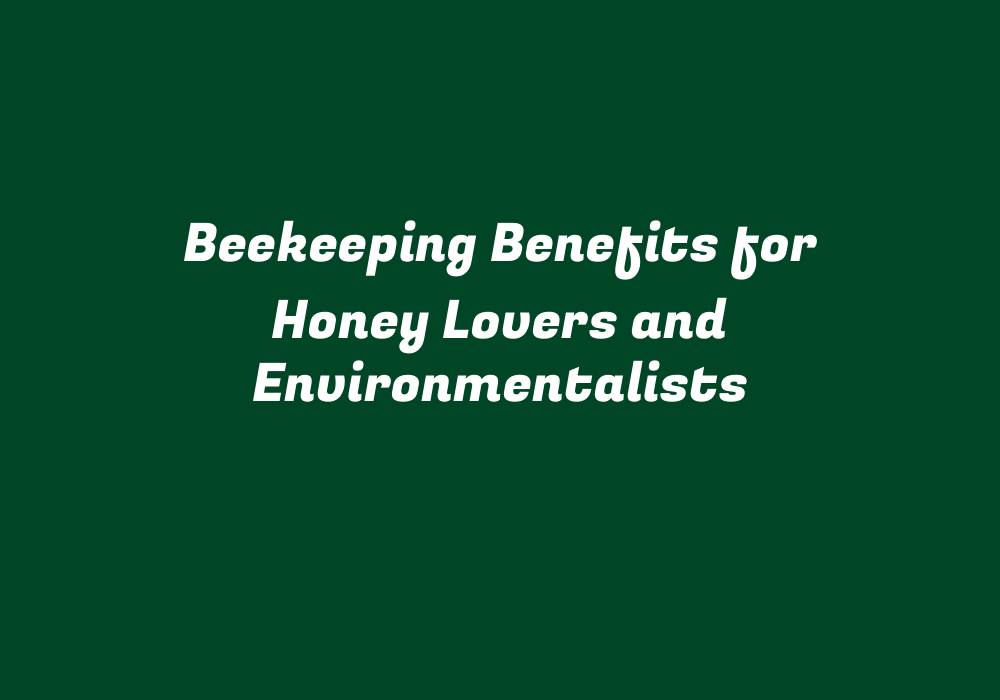The world of beekeeping holds immense importance to honey lovers, environmentalists, and the entire ecosystem. This ancient art has made a significant impact on society’s dependence upon nature’s bounty and its connection with the environment. It is not only about producing honey; it offers various ecological and economic benefits that are vital for our planet’s well-being.
Environmental Benefits
Beekeeping provides a crucial role in maintaining the health of ecosystems by enhancing biodiversity, promoting pollination, and supporting plant life. Honeybees are responsible for roughly one-third of our food supply. They play an essential part in plant reproduction, fertilizing flowers and transferring pollen between them. This process ultimately contributes to a healthy, balanced ecosystem.
Pollination and Sustainable Agriculture
Bees are vital contributors to agriculture as they perform essential services in the production of many fruits and vegetables through pollination. Approximately 80% of flowering plants rely on insects, primarily bees, for this process. By maintaining a healthy population of bees through beekeeping, we ensure the proper functioning of our agricultural sector. Additionally, it supports sustainable agriculture by encouraging more natural methods over chemical-based practices that can harm bees and their habitats.
Beekeeping for Honey Production
Honey is a naturally produced sweetener prized for its medicinal properties and nutritional value, making it an essential food item throughout history. Beekeepers collect the honey from their hives without causing harm to the bees or affecting their natural habitat. This practice supports local farmers and businesses while promoting sustainable growth and resource management.
Bees as Indicators of Environmental Health
Beekeepers are in a unique position to monitor the health of the environment due to their direct interaction with bee colonies. Any changes in the quality or quantity of honey, pollen, and propolis can serve as indicators for potential environmental issues. Beekeeping fosters an awareness that allows us to make informed decisions, thus contributing to better management and care for our planet.
Education and Outreach
By engaging in beekeeping activities, individuals can learn about the importance of environmental stewardship and biodiversity conservation. This knowledge then has the potential to impact others through shared experiences or information disseminated at events and workshops. By promoting awareness among the general public, beekeepers foster a culture that values our natural resources and encourages collective action towards sustainability.
Supporting Local Honey Bees
Beekeeping is an effective way to support local honey bee populations by providing the necessary resources for their survival. By maintaining healthy hives with proper nutrition, beekeepers contribute significantly to ensuring that these vital pollinators remain a part of our world for future generations.
Sustainable Beekeeping Practices
Beekeepers have the responsibility of upholding sustainable practices within their operations. These include utilizing organic and chemical-free methods, reducing bee migration, minimizing energy consumption, and promoting ethical treatment of bees. By adhering to these principles, beekeepers can ensure a healthy future for both the bees themselves and our planet.
Conclusion
Beekeeping holds vast importance for honey lovers, environmentalists, and society at large. It contributes to essential elements such as pollination, plant life support, sustainable agriculture, food production, environmental health monitoring, education, and conservation of local bee populations. By understanding the significance and potential impact of beekeeping, individuals can become more invested in learning about our planet’s well-being and making informed decisions that support a healthy environment for generations to come.
Frequently Asked Questions About Beekeeping
1. What are the benefits of beekeeping?
Beekeeping offers several environmental, economic, and social advantages such as promoting pollination, sustaining agriculture, producing honey, monitoring environmental health, supporting local populations, and educating others about sustainable practices.
2. Can I start beekeeping in my backyard?
Yes, many people have successfully started beekeeping in residential areas with proper guidance and safety precautions taken to minimize any negative impacts on the environment or neighbors.
3. What are the potential challenges of beekeeping?
There might be some challenges for beginners such as acquiring knowledge, managing hive health, adapting to local weather conditions, controlling pests and diseases, and ensuring ethical treatment of honeybees.
4. How can I contribute to environmental conservation through beekeeping?
By practicing sustainable beekeeping techniques like utilizing organic methods, minimizing energy consumption, promoting ethical treatment of bees, and working towards maintaining a healthy environment, beekeepers contribute significantly to the well-being of our planet and its inhabitants.
5. Is there any difference between honey from managed and wild bees?
While both types of honey can vary depending on their source, managed hives may produce larger amounts with consistent quality due to the controlled environment and proper management techniques used by experienced beekeepers.
